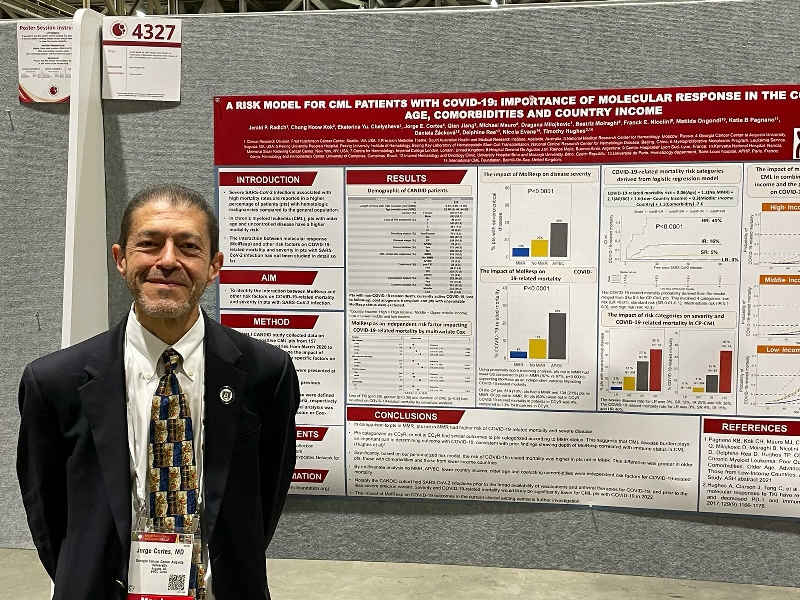 ‘The iCMLf CANDID study gave confidence for physicians worldwide that their patients with well controlled CML were not at greater risk from COVID-19 than the general population and no changes to CML therapy specifically due to SARS-CoV-2 infection were required.’
‘The iCMLf CANDID study gave confidence for physicians worldwide that their patients with well controlled CML were not at greater risk from COVID-19 than the general population and no changes to CML therapy specifically due to SARS-CoV-2 infection were required.’
(Professor Jorge Cortes)
December 2022 - Through 2020-2022 the real-world data from the iCMLf CML and COVID-19 registry has helped to answer key questions on the impact of COVID-19 for patients with CML and continues to explore the impact of specific factors on risks and outcomes, as the pandemic continues.
The recent poster presentation at the American Society of Hematology meeting - "A Risk Model for CML Patients with COVID-19:Importance of Molecular Response in the Context of Age, Comorbidities and Country Income has the conclusion that “based on our personalized risk model, the risk of COVID-19-related mortality was higher in patients not in MMR”. This continues to illustrate the risk factors for people with CML and inform them and their physicians.
Below we summarise the key data that have been presented at major meetings from this important registry.
The iCMLf CANDID (Cml AND covID) Study – Overview of key data
The last few years of the pandemic have been very challenging and physicians around the world treating patients with CML have been faced with many questions. In such an ever-evolving situation, global co-operation is key to share experiences.
As a global organization, the iCMLf had an important role to play here to gather and to analyse data on the impact of COVID-19 for people with CML from local centres around the world. With the iCMLf CANDID study, we have launched the largest global cohort study to date with 1,050 COVID-19 and CML cases from 58 countries.
1. Update CANDID study:
There was a higher mortality in older patients (>75y), patients with cardiovascular or pulmonary comorbidities and in those from lower middle-income countriesThe mortality rate from COVID-19 in CML was lower than other hematological malignancies; most reported cases were mild and moderate
Oral presentation by lead author Katia Pagnano (Brazil) at the American Society of Hematology (ASH) Meeting 2021.
Read the full abstract here
2. Sub-analysis - Impact on TFR status:
Patients in TFR had similar severity and survival to CML patients who were on TKI and there was no evidence of an increased risk of TFR loss after SARS-CoV-2 infection
Poster presentation by lead author Susanne Saußele (Germany) at the European Hematology Association (EHA) Congress 2022.
Read the full abstract here
3. Sub-analysis - Impact of TKI treatment:
Survival for patients with CML on TKI is remarkably high and there is no difference in survival considering the type of TKI used. This supports that is safe to maintain all TKI treatments during SARS-CoV-2 infection.
Poster presentation by author Ana-Ines Prado (Uruguay) at the John Goldman Conference on CML: Biology and Therapy 2022
Read the full abstract here
4. Sub-analysis - Impact of molecular response status:
Based on our personalized risk model, the risk of COVID-19-related mortality was higher in patients not in MMR. This difference was greater in older patients, those with comorbidities and those from lower income countries.
Poster presentation by lead author Jerry Radich (USA) at the American Society of Hematology (ASH) Meeting 2022.
Read the full abstract here
5. Sub-analysis – Impact of country income
Lead author: Hemant Malhotra (India) – publication in progress
The full publication is expected soon and we will keep you posted.
This huge endeavour would not have been possible without a truly global collaboration. We like to sincerely thank all the 200 physicians who contributed data.
Sincere thanks also go to Novartis Oncology and Pfizer for study funding.
We acknowledge and thank our partners The Max Foundation and CML Advocates Network for their support with case collection.










